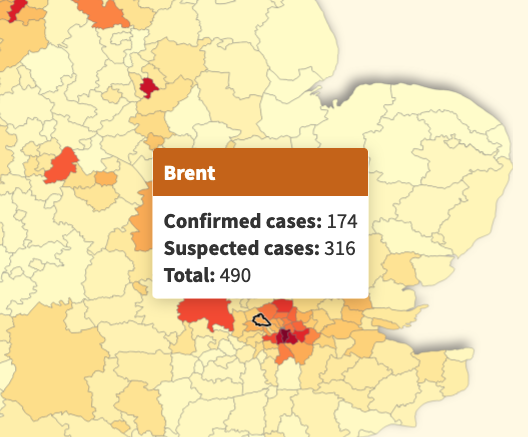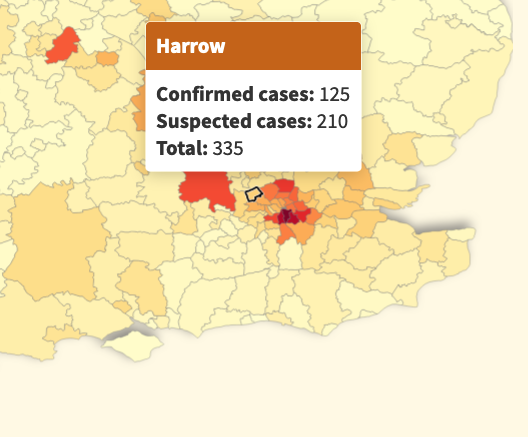UK Health Security Agency Omicron cases in Brent amd Harrow as of December 13th
FROM harrow.gov.uk
The Head of the UK Health Security Agency has called the Omicron variant “probably the most significant threat” since the start of the pandemic.
- Omicron is serious and spreading fast
- Vaccination is the best defence - get your booster jab
- Hands, Face, Space and Ventilate remain vital
- Think carefully about Christmas plans
Omicron and Christmas by Carole Furlong, Harrow Director of Public Health
Though we're all very tired of Covid and hoping to see people this Christmas, we must take this new threat very seriously. Omicron is far more transmissible than anything we’ve seen before.
More than 77,000 new cases were recorded in the UK yesterday, 16th December – the biggest increase in a single day. This record though is set to be broken repeatedly in the coming days and weeks, with the number of Covid cases nationwide currently doubling every couple of days. This level of infection and the potential absences from workplaces could have serious implications for the running of services.
The data for Harrow shows a more than 97% increase in cases when the last 7 days are compared with the previous 7. As Harrow’s Director of Public Health I’m very concerned about this.
London is once again on the frontline. One of the things that makes the capital more vulnerable is the relatively low levels of vaccination. Across the UK more than 81% of the population have had their first two doses of vaccine. In London that drops to 61%, and in Harrow it’s 64%.
That leaves a significant proportion of our community less protected and we will continue to encourage people to come forward for their first, second and booster jabs. On our YouTube channel you’ll find a number of videos from local health professionals and members of the public talking about the benefits of Covid vaccination. Most compelling are those that were unsure about vaccination but are now advocates for it.
Omicron is very new and is still little understood. Early reports that it is less serious than other strains should be treated with caution. These ideas have been drawn from study of Omicron’s area of origin in southern Africa, where the population is much younger.
What we do know is that Omicron is very highly infectious. Vaccination is our most effective tool, but we must use it alongside simple precautions like handwashing, wearing of face coverings and social distancing.
We all know by now the steps we can take to limit the spread of infection and while we don’t expect that there will be any formal lockdown type restrictions imposed in England before Christmas, I’m appealing to everyone to do all you can to protect yourself and your family and slow the spread of this dangerous new variant.
Face coverings are now mandatory in most indoor settings and a newly introduced Covid pass, confirming vaccination status or a recent negative test, is now required for entry to large gatherings, such as concerts.
I agree with Dr Chris Whitty, England’s Chief Medical Officer, who recommends we carefully consider our planned social contact this festive period and prioritise the important occasions, or otherwise risk contracting Covid and being unable to meet those people we care about most.
The implication of this advice is that a significant proportion of the population is expected to contract Omicron, as it becomes the dominant variant in the UK.
Before you mix with other people, get a negative lateral flow test and encourage others to do the same. If you’re indoors, think about ventilation. Most Covid transmission occurs through the air. Keeping the air circulating is an effective way to reduce potential build up of virus and limit its opportunities to spread.
Vaccination
Our best defence against Omicron is vaccination. Vaccines both protect the person receiving them – they are less likely to be seriously ill if they contract the virus – but also reduces the risk of them passing it on to others. Omicron’s remarkable transmissibility pits us in a race against time – vaccinating on a huge scale at the same time as Omicron is moving through the population at such worrying speed.
Eligibility for booster jabs has now been extended to include anyone aged 18 and over.
We've been working closely with the NHS to help meet the huge demand for
jabs that has been created. Together we're opening a number of
vaccination clinics offering booster jabs and, for those that still need
them, first and second doses.
If you had your second jab at least three months ago, you can book your booster now. Appointments are being added all the time to the national booking system.
Walk in appointments are available over the weekend and Monday at Civic 5, the building to the right of the main Civic Centre. We’re ramping up capacity in this clinic, which can also be booked through the national system, and hope it will soon operate 7 days a week.
If you’re coming to this clinic without a booked appointment, please arrive between 9am and 6pm, be prepared for a long wait outdoors and plan accordingly. Walk in appointments are also available at some local pharmacies. See further information about these and other vaccine centres across North West London. There are also special pop-up sessions at Chelsea FC on Saturday and Wembley stadium on Sunday.
Testing – without symptoms
Please use lateral flow tests regularly and before mixing with others. Many people can have Covid and not show any symptoms and even though they feel fine, are still able to infect others. Testing regularly helps to find these hidden cases and break the chain of infection.
If you are a contact of someone with Covid-19, the NHS Test and Trace Team will inform you, and decide if you need to isolate. This decision will depend on several factors but critically you do not need to isolate if you are fully vaccinated, instead you will be asked to undertake daily lateral flow tests. Please note if you are told to isolate it is a legal requirement.
After some disruption, the online ordering of test kits is working again. We understand some local pharmacies are running low on stock. 16 pharmacies in Harrow offer assisted testing, where your test is processed for you onsite, and this service is still working well.
Testing – with symptoms
If you have symptoms of Covid – a fever, continuous cough or a change in your sense of taste or smell – you must stay at home and not have visitors and get a PCR test as soon as possible.
Self-isolation is the most effective way of limiting your contact
with others and minimising Covid’s opportunities to infect more people.
We’ve been working with the NHS to help increase the number of PCR tests
that can be offered in Harrow. The mobile testing unit outside the
Civic Centre is now open 7 days a week and will operate throughout the
Christmas break.


